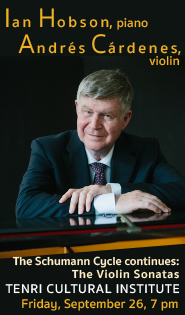‘The Hours’ returns to the Met with new layers of meaning

Some things are even better the second time around. Kevin Puts’s The Hours was a run-away hit for the Metropolitan Opera last season, playing to sold-out audiences. It returned on Sunday afternoon with its trio of stars—sopranos Renée Fleming and Kelli O’Hara and mezzo-soprano Joyce DiDonato—reprising their roles. The audience came back as well, with its enthusiasm unabated.
The opera is based on Michael Cunningham’s novel The Hours and its Oscar-winning film adaptation. The plot intertwines the lives of two women living in different eras who are connected through Virginia Woolf’s novel Mrs. Dalloway, as well as the author herself.
Woolf is shown bridling at living in Richmond, a bucolic suburb of London, where she works on her novel in 1923. Post-World War II Los Angeles is where Laura Brown struggles to conform to the role of wife and mother. Clarissa Vaughan confronts the mortality of her life-long friend Richard, who is dying from AIDS, and her partner Sally’s desire to have a child in Manhattan at the end of the twentieth century.
Puts masterfully achieves the nonstop time travel in his score. Whirls of transparent, colorful, scintillating music, both choral and orchestral, propel the action from one locale to another and work just as effectively to combine them at the end of the opera.
Director Phelim McDermott likewise solved these challenges with efficiency and elegance. Unit sets appear from the wings or drop from above to depict the three locales in which the action is set. Movement too plays a role, with Annie-B Parson’s choreography adding flow and emotion to the innumerable scene changes.
There was a greater sense of balance to this performance than there was at the opera’s Met premiere in November 2022. Then, Joyce DiDonato’s intense, brooding Woolf dominated the action. Now Fleming’s Clarissa and O’Hara’s Laura Brown are on equal footing both dramatically and vocally. Conductor Kensho Watanabe’s attention to balance undoubtedly played a role in this.
Fleming’s Clarissa remains charming and effervescent, seemingly ill-equipped or unwilling to face reality. Puts tailored the role to the soprano’s current vocal state. It is set mostly in the middle of Fleming’s range, which retains its plushness. There are the occasional high notes, which still bloom lovely and effortlessly even in this late stage of the soprano’s career.
As Woolf, DiDonato illuminated the birth pains of her new novel, as well as her fragile mental state, with a fierce intensity. The far-away sound in her voice as she searches for the opening line of the novel—“Mrs. Dalloway said she would buy the flowers herself”—and muses over which character will die was haunting. DiDonato’s Woolf, however, roared when frustrated, chiefly over her exile from London upon her doctor’s orders.

O’Hara’s Laura Brown has emerged to become the central character in this multi-layered tragedy. The Broadway star’s all-American sweetheart is a tormented soul, whose anguish O’Hara captured with a direct, unassuming naturalness. O’Hara’s Laura was aware of the emotional carnage she has caused, but confident that her decision to abandon her family was the only possible path for her to take.
The rest of the original cast is also in place for this run. Bass-baritone Kyle Ketelsen leavens his insolent, defiant Richard with the affection he has for Clarissa. They bask in the memories of a perfect summer day in Wellfleet, Mass. on the morning after they made love for the first and only time.
Louis was the third participant in that youthful summer sojourn, which overflowed with sexual tension and hope. Tenor William Burden expressed Louis’s regret over his neglect of the dying man, who was once his lover, with heartfelt compassion. His comment to Clarissa that Richard only wanted him for his body, while he needed her for everything else, cut to the quick.
Puts and librettist Greg Pierce made numerous revisions to The Hours prior to its Met premiere. More streamlining would make for even greater dramatic impact, especially in the sprawling first act. Far too many characters make all too brief appearances with no opportunity for their characters to develop.
Denyce Graves’ ebullient Sally is one of them. You just want to see and hear more of this vocal and dramatic dynamo. The same goes for Brandon Cedel’s Dan Brown, Laura’s husband, who lights up the stage with his big, warm-hearted voice and no-fuss wholesomeness. As Leonard Woolf, the author’s husband, tenor Sean Panikkar has scant opportunity to make an impression.
Soprano Kathleen Kim is a total delight as owner of the shop where Clarissa buys flowers for her party. She unabashedly hits upon Clarissa in wonderful flights of coloratura fancy. With his pure, penetrating voice, countertenor John Holiday evocatively weaves through the story adding an additional layer of musical complexity, but little in the way of dramatic coherency.
As the only newcomer to the production, Watanabe made his presence felt in the pit. He reveled in mining the riches in Puts’s richly textured score, instilling nuance whenever possible, especially in its lighter, scintillating passages. It was this conductor’s unerring sense of balance in all regards, however, that made the greatest impact in this moving performance.
The Hours runs through May 31. metopera.org


